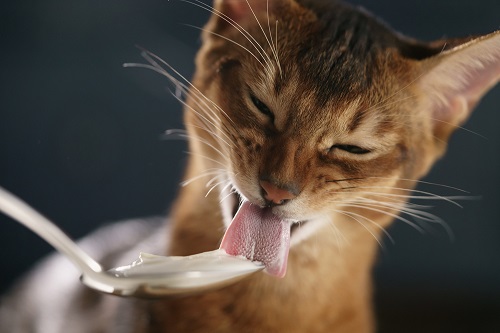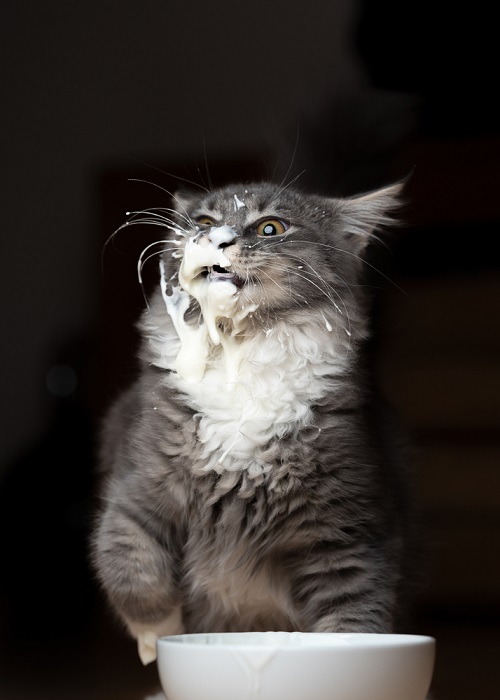Can Cats Eat Greek Yogurt? Is Greek Yogurt Safe for Cats? The answers might surprise you! Read on to know more!
Greek yogurt is a breakfast favorite for many, but what about your feline companions? Can Cats Eat Greek Yogurt, or is it off the menu for them? Let’s uncover the truth below.
Can Cats Eat Butter? Find out here
What is Greek Yogurt?

Greek yogurt is a thick and creamy yogurt. It is made by straining regular yogurt to remove the whey. This results in a higher protein content and a velvety texture. It has a tangy flavor and is a good source of protein, calcium, and probiotics. Greek yogurt is versatile and can be enjoyed on its own. However, it can also be used as a healthier substitute for sour cream, mayonnaise, or other high-fat ingredients in various recipes.
Can Cats Eat Greek Yogurt? | Can Cats Have Plain Greek Yogurt?
Yes, cats can eat small amounts of plain, unsweetened Greek yogurt as an occasional treat, but it should not be a significant part of their diet. Always monitor your cat for any signs of digestive upset, as some felines may not tolerate yogurt well. If your furball displays any adverse health effects or allergic reactions after yogurt’s consumption, contact a vet immediately.
Is Greek Yogurt Safe for Cats?

Greek yogurt is safe for cats in small quantities. Make sure to choose plain, unsweetened Greek yogurt, as it does not contain any artificial sweeteners or flavors harmful to felines. However, always remember that cats are lactose intolerant, so too much yogurt can cause stomach upset and other issues. As with any new food, introduce Greek yogurt to your cat slowly and in small amounts to make sure that they tolerate it well.
Is Greek Yogurt Good for Cats?
Greek yogurt are good for felines but in moderation occasionally. While they do not have a strict dietary requirement for dairy products, some kitties can tolerate small amounts of dairy without any issues.
Are Cats Attracted to Greek Yogurt?
Cats may show some interest in Greek yogurt due to its creamy texture and sometimes tangy flavor. However, it varies from cat to cat, and not all cats may be attracted to or enjoy the taste of Greek yogurt. Some kitties may even show no interest at all.
Risks of Feeding Greek Yogurt to Cats
Feeding Greek yogurt to cats carries certain risks, which are:
- Lactose intolerance: Cats are typically lactose intolerant, meaning they lack the necessary enzyme to break down lactose, the sugar present in milk and dairy products. Greek yogurt contains lactose, although in smaller amounts than regular yogurt. Some felines can experience digestive upset, such as diarrhea or vomiting.
- Nutritional imbalance: Cats are obligate carnivores and have specific dietary requirements. While Greek yogurt can provide some protein and calcium, it should not replace a balanced feline diet.
- Added ingredients: Flavored or sweetened Greek yogurt often contains additives, artificial sweeteners like xylitol, or other ingredients that are harmful to cats. These additives can be toxic and should be avoided.
- Weight gain and obesity: Greek yogurt, although a healthier option compared to some other treats, still contains calories. Overfeeding can lead to weight gain and obesity in cats.
- Individual sensitivities: Just like humans, felines can have individual sensitivities or allergies to certain foods, including dairy products. It’s important to monitor the cat’s response when introducing Greek yogurt.
Signs of Greek Yogurt Allergy or Health Issues
Signs of a potential Greek yogurt allergy or health issues in cats are:
- Digestive upset: Diarrhea, vomiting, or gas.
- Skin reactions: Itching, redness, rashes, or irritations.
- Lethargy or weakness: Unusual tiredness or lack of energy.
- Changes in appetite or thirst: Loss of interest in food or water.
Tips For Preventing Accidental Ingestion Of Greek Yogurt

To prevent accidental ingestion of Greek yogurt in cats, consider the following tips:
- Store Greek yogurt securely: Keep Greek yogurt containers tightly sealed and stored in a refrigerator or cupboard out of your cat’s reach.
- Dispose of containers properly: Ensure that empty yogurt containers are properly discarded and not accessible to your cat, as they may still contain traces of yogurt that can be tempting to them.
- Avoid sharing: Refrain from intentionally feeding Greek yogurt to your cat, as it can lead to digestive issues or potential allergies.
- Be cautious during meal preparation: Keep felines far away from the kitchen while preparing or consuming Greek yogurt to prevent them from trying to steal a bite.
- Educate family members and visitors: Inform household members and guests about the risks of feeding Greek yogurt to kitties.
- Monitor your cat’s surroundings: Be aware of any potential sources of Greek yogurts, such as spills or leftover yogurt on plates, and clean them promptly.
Options Other Than Greek Yogurt
There are several alternative options to Greek yogurt for cats:
- Canned wet cat food: High-quality, canned wet cat food provides a balanced and complete diet for cats, meeting their nutritional needs.
- Fresh meat or cooked chicken: Offer small portions of cooked, unseasoned meats like chicken as a treat or supplement to their regular cat food.
- Freeze-dried meat treats: Freeze-dried meat treats specifically formulated for cats can be a healthy and tasty alternative to Greek yogurt.
- Cat-friendly fruits and vegetables: Some cats enjoy small portions of cat-safe fruits and vegetables, such as cooked pumpkin, pomegranate, steamed carrots, lettuce, or small pieces of cantaloupe. However, consult with the vet for appropriate options and serving sizes.
- Commercial cat treats: Look for commercially available cat treats made with high-quality ingredients that are specifically formulated for feline dietary needs.
Can Cats Eat Greek Yogurt? Quick Takeaways!
- Ingesting Greek yogurt can lead to a few minor health issues if your cat is not suited to it or if it is consumed in large quantities.
- Some felines can show interest in the tangy flavor of Greek Yogurt.
- Signs of Greek Yogurt intolerance are skin irritation, respiratory symptoms, digestive issues, and lethargy.
- Some safe alternatives to Greek Yogurt are canned wet cat food, fresh meat or cooked chicken, freeze-dried meat treats, and cat-friendly fruits and vegetables.


